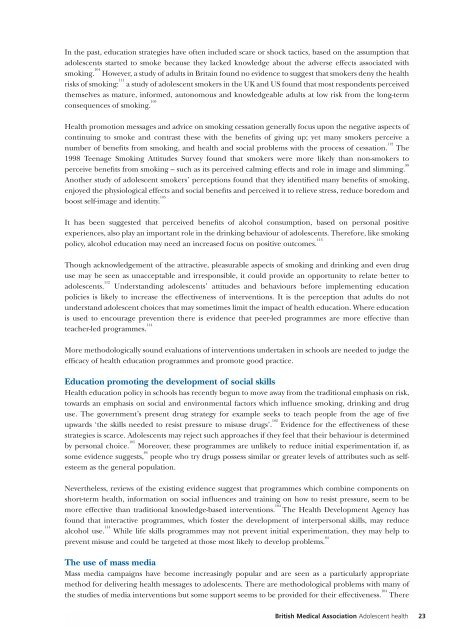Alcohol misuse: tackling the UK epidemic - London
Alcohol misuse: tackling the UK epidemic - London
Alcohol misuse: tackling the UK epidemic - London
Create successful ePaper yourself
Turn your PDF publications into a flip-book with our unique Google optimized e-Paper software.
In <strong>the</strong> past, education strategies have often included scare or shock tactics, based on <strong>the</strong> assumption that<br />
adolescents started to smoke because <strong>the</strong>y lacked knowledge about <strong>the</strong> adverse effects associated with<br />
smoking. 104<br />
However, a study of adults in Britain found no evidence to suggest that smokers deny <strong>the</strong> health<br />
risks of smoking: 111<br />
a study of adolescent smokers in <strong>the</strong> <strong>UK</strong> and US found that most respondents perceived<br />
<strong>the</strong>mselves as mature, informed, autonomous and knowledgeable adults at low risk from <strong>the</strong> long-term<br />
consequences of smoking. 105<br />
Health promotion messages and advice on smoking cessation generally focus upon <strong>the</strong> negative aspects of<br />
continuing to smoke and contrast <strong>the</strong>se with <strong>the</strong> benefits of giving up; yet many smokers perceive a<br />
number of benefits from smoking, and health and social problems with <strong>the</strong> process of cessation. 112<br />
The<br />
1998 Teenage Smoking Attitudes Survey found that smokers were more likely than non-smokers to<br />
perceive benefits from smoking – such as its perceived calming effects and role in image and slimming. 89<br />
Ano<strong>the</strong>r study of adolescent smokers’ perceptions found that <strong>the</strong>y identified many benefits of smoking,<br />
enjoyed <strong>the</strong> physiological effects and social benefits and perceived it to relieve stress, reduce boredom and<br />
boost self-image and identity. 105<br />
It has been suggested that perceived benefits of alcohol consumption, based on personal positive<br />
experiences, also play an important role in <strong>the</strong> drinking behaviour of adolescents. Therefore, like smoking<br />
policy, alcohol education may need an increased focus on positive outcomes. 113<br />
Though acknowledgement of <strong>the</strong> attractive, pleasurable aspects of smoking and drinking and even drug<br />
use may be seen as unacceptable and irresponsible, it could provide an opportunity to relate better to<br />
adolescents. 112<br />
Understanding adolescents’ attitudes and behaviours before implementing education<br />
policies is likely to increase <strong>the</strong> effectiveness of interventions. It is <strong>the</strong> perception that adults do not<br />
understand adolescent choices that may sometimes limit <strong>the</strong> impact of health education. Where education<br />
is used to encourage prevention <strong>the</strong>re is evidence that peer-led programmes are more effective than<br />
teacher-led programmes. 114<br />
More methodologically sound evaluations of interventions undertaken in schools are needed to judge <strong>the</strong><br />
efficacy of health education programmes and promote good practice.<br />
Education promoting <strong>the</strong> development of social skills<br />
Health education policy in schools has recently begun to move away from <strong>the</strong> traditional emphasis on risk,<br />
towards an emphasis on social and environmental factors which influence smoking, drinking and drug<br />
use. The government’s present drug strategy for example seeks to teach people from <strong>the</strong> age of five<br />
upwards ‘<strong>the</strong> skills needed to resist pressure to <strong>misuse</strong> drugs’. 102<br />
Evidence for <strong>the</strong> effectiveness of <strong>the</strong>se<br />
strategies is scarce. Adolescents may reject such approaches if <strong>the</strong>y feel that <strong>the</strong>ir behaviour is determined<br />
by personal choice. 105<br />
Moreover, <strong>the</strong>se programmes are unlikely to reduce initial experimentation if, as<br />
some evidence suggests, 84<br />
people who try drugs possess similar or greater levels of attributes such as selfesteem<br />
as <strong>the</strong> general population.<br />
Never<strong>the</strong>less, reviews of <strong>the</strong> existing evidence suggest that programmes which combine components on<br />
short-term health, information on social influences and training on how to resist pressure, seem to be<br />
more effective than traditional knowledge-based interventions. 104<br />
The Health Development Agency has<br />
found that interactive programmes, which foster <strong>the</strong> development of interpersonal skills, may reduce<br />
alcohol use. 114<br />
While life skills programmes may not prevent initial experimentation, <strong>the</strong>y may help to<br />
prevent <strong>misuse</strong> and could be targeted at those most likely to develop problems. 84<br />
The use of mass media<br />
Mass media campaigns have become increasingly popular and are seen as a particularly appropriate<br />
method for delivering health messages to adolescents. There are methodological problems with many of<br />
<strong>the</strong> studies of media interventions but some support seems to be provided for <strong>the</strong>ir effectiveness. 104<br />
There<br />
British Medical Association Adolescent health 23
















